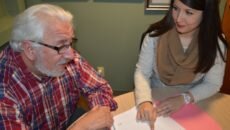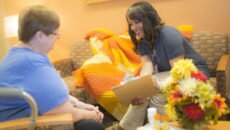Access to healthcare services is critical to good health, yet rural residents in Kentucky face a variety of access barriers that limit their ability to obtain the care they need.
Economic factors, cultural and social differences, educational shortcomings, sheer isolation with limited access to transportation and lack of recognition by legislators all conspire to create healthcare disparities and impede rural Kentuckians in their struggle to lead normal, healthy lives.
We spoke to several rural health providers around Kentucky to hear their thoughts on rural healthcare in Kentucky. Below are the highlights.
Medical News: What are some of the unique challenges and opportunities facing rural healthcare providers?

Philip Hurley, MD Owensboro Health
Philip Hurley, MD: Poverty is a big problem. What do you say to a patient who states that they don’t have money to buy gas to go to their appointments? Another problem is addiction to drugs, tobacco and alcohol. Whereas these addictions can affect all socioeconomic brackets, the effects on the poor tend to be more devastating as family and public support are often not as readily available.
Obesity is another challenge. Sadly, our country has the dubious distinction of being the first country in history where the poor are obese. In days gone by, if you were poor, you simply could not buy enough food to become obese. (During my trips to Haiti, I have learned that having an obese wife is considered a status symbol by husbands.) As an orthopedic surgeon, obesity makes it more difficult to treat any condition, often significantly increasing the risks of complications of my treatments.
There are opportunities as well. People who live in a rural setting often live simpler lives. They tend to be less demanding and have more realistic expectations of healthcare providers than people who live in big cities. They tend to be a little bit more trusting. This can result in a stronger doctor-patient relationship.

Susan Starling, Mercy Health–Marcum and Wallace Hospital
Susan Starling: One challenge is working with limited financial, human and specialty services resources. However, sometimes these challenges can be opportunities, as it forces rural providers to be innovative and build networks and partnerships with other healthcare providers in the community.
Another challenge is reimbursement limitations. Multiple, small reimbursement cuts–from both federal and state reimbursements–collectively add up and can significantly impact the operations of a facility. Rural communities tend to have higher rates of Medicare, Medicaid and uninsured patients. A third challenge is how to most effectively share patient success stories with community members.
An opportunity is the unique environment and culture of rural parts of Kentucky. With a small population, you are providing care to a familiar community. Likewise, patients are more comfortable accessing care when they know their caregivers. I like to say that we are “family and friends, caring for family and friends.”

LaTonia Sweet, MD
Molina Healthcare
LaTonia Sweet, MD: One barrier is the shortage of providers–both specialists and primary care. This often leads to providers going into rural areas and becoming overwhelmed with the need and lack of resources. For example, if I need a patient to see a specialist, sometimes there is not one available within hours of their home. This is often something patients and providers struggle with. Not only is healthcare expensive, being able to access that care can be expensive or simply impossible.
As for opportunities, nowhere else can a physician use the same depth and breadth of skills needed as in rural healthcare. A physician can make a huge impact on the health of a community in rural areas.

Patrick Withrow, MD, Baptist Health Paducah
Patrick Withrow, MD: I practiced cardiology in a town of about 30,000 people. Because the population of patients that we drew from was around 250,000, we had enough sophisticated equipment to utilize our sub-specialty training.
We also were active in recruiting both primary and sub-specialty care physicians. Consistently, one of our difficulties was making sure the spouse or the partner of the doctor was happy with this rural setting.

R. Brent Wright, MD,
UofL School of Medicine
Brent Wright, MD: Rural healthcare faces challenges in resources and access. Rural areas work continuously to recruit talent for healthcare delivery. In addition to recruitment issues, there are continuous regulatory and technology demands that strain existing resources (electronic medical records (EMRs), quality initiatives and value based care). These initiatives drain resources from shrinking margins.
Medical News: How did your education and training prepare you for working in a rural environment? What additional training would you like for the next generation of providers to have?
Philip Hurley, MD: I attended the University of Arkansas for Medical Sciences. We were encouraged to do some of our third and fourth year training in rural settings with providers affiliated with the medical school. Many were very established physicians who had a wealth of knowledge that they were all too glad to share with bright eyed and eager students. This is the best way for physicians in training to get the exposed to rural healthcare.
Susan Starling: My masters focused on administration in rural healthcare. Future programs need to have options that promote learning and training opportunities in rural communities. When students are given the opportunity to explore rural healthcare, you experience a higher rate of return to rural after their education.
LaTonia Sweet, MD: I went to medical school at the University of Kentucky. I was interested in rural health and the Area Health Education Centers (AHEC) office arranged a few rural rotations for my training. It was a terrific experience that allowed me to see how rural healthcare providers work.
I think continuing to encourage rural physicians to volunteer through AHEC to mentor students and prepare them for clinical practice outside of the larger medical centers. Future healthcare providers should be trained on new models of care. Since there are shortages of specialists (especially in rural areas) learning consultative models and collaborative care will be essential for using specialty resources wisely, while giving greater support to primary care. As a psychiatrist I believe more psychiatrists, therapists and primary care providers should be trained to provide true integrated care that takes a population health approach, not just co-located care.
Patrick Withrow, MD: My field of training (sub-specialty of interventional cardiology) did not offer much in the way of training for a rural environment. Some emphasis on community and public health would be time well spent to a rural practice. Social economic issues seem to be increasing all over our country. Whether it is the opioid epidemic or violence in our country, there seems to always be a problem on the horizon.
Brent Wright, MD: Growing up in a rural environment helps to understand the culture and values of rural areas. Working with AHEC in arranging third and fourth year medical student rotations was invaluable regarding the exposure to practice within a community setting. I would like future learners to understand that rural healthcare is important for diversity. The culture of rural citizens must be embraced as in any other unique culture. We all must work to dispel stereotypes as there are many educated and talented individuals in rural America.
Medical News: What innovations or trends are you seeing in healthcare, as it relates to rural health?
Philip Hurley, MD: Without a doubt, telemedicine. While there is no substitute for being able to touch a patient when trying to treat them, being able to at least see them and communicate with them directly is the next best thing. Electronic health records (HER) have helped, but most EHR records are close to garbage. It is often very difficult to glean useful, pertinent information. The electronic imaging and the ability to view it remotely is helpful.
Susan Starling: As we evolve into a value-based care (accountable care organization environment), we need to provide the critical access hospitals with payment methodology. This methodology would provide support to focus on caring for patients and providing healthcare to the community. It’s a necessity for patients to be able to access care locally, so systems need to continue to support local care and keeping our community healthy.
LaTonia Sweet, MD: Integrated care, telemedicine systems and innovative programs like Project Echo have begun in rural areas. Advances in health information technology has also allowed very remote providers access to more information faster than ever before.
Patrick Withrow, MD: The innovations of genetics to help characterize special treatment modalities for different diseases and preventive techniques are coming. This innovation may be harder to maintain competency in the rural setting. The type of practices and the daily demands may not bode well for staying updated with this newest technology.
Brent Wright, MD: Technology is making it possible for connections to be achieved in a simple, secure and affordable way. Telemedicine will see a resurgence as we all become more mobile through our smart devices. Brick and mortar healthcare will not be as necessary as bandwidth and connectivity increases. This is great for rural health because it means less travel and more access.
Medical News: What changes would you like to see to improve healthcare in the rural parts of Kentucky?
Philip Hurley, MD: More physicians is the best way to improve healthcare in rural Kentucky. To accomplish this, we need to graduate more physicians and need to make it financially attractive for them to go to a rural setting. Programs that provide either financial assistance to medical students or that result in training debt forgiveness could be very beneficial.
Susan Starling: Improved access to mental health, which has become very centralized in the urban areas; local access to alcohol and drug treatment centers; and support of critical access hospital programs and other federal programs that support rural healthcare.
LaTonia Sweet, MD: Reimbursement for new models of care, such as collaborative care and other models, that allow specialists to assist primary care providers in care for patients.
Patrick Withrow, MD: High farmer and rural suicide rates are shocking and need to be addressed. The wide geographic population and resultant limited mental and medical health resources in rural areas is a problem. Telemedicine may be a way to improve access to care. Also, the expansion of medical training to the more rural areas (Morehead, Bowling Green, Glascow and northeast Kentucky) will improve access to care.
Brent Wright, MD: Greater connectivity and more innovation pilots. Rural areas are perfect for innovation test cases. It’s easy to create something in San Francisco, Boston and New York. Make it work in the rural environment and the technology will work everywhere.
Latest posts by Sally McMahon (see all)
- Hosparus Health raises $28 million in campaign - November 21, 2021
- Write a letter or email your legislator, help Kentucky nurses - November 21, 2021
- Health Enterprises Network hosts discussion on health equity - November 21, 2021



